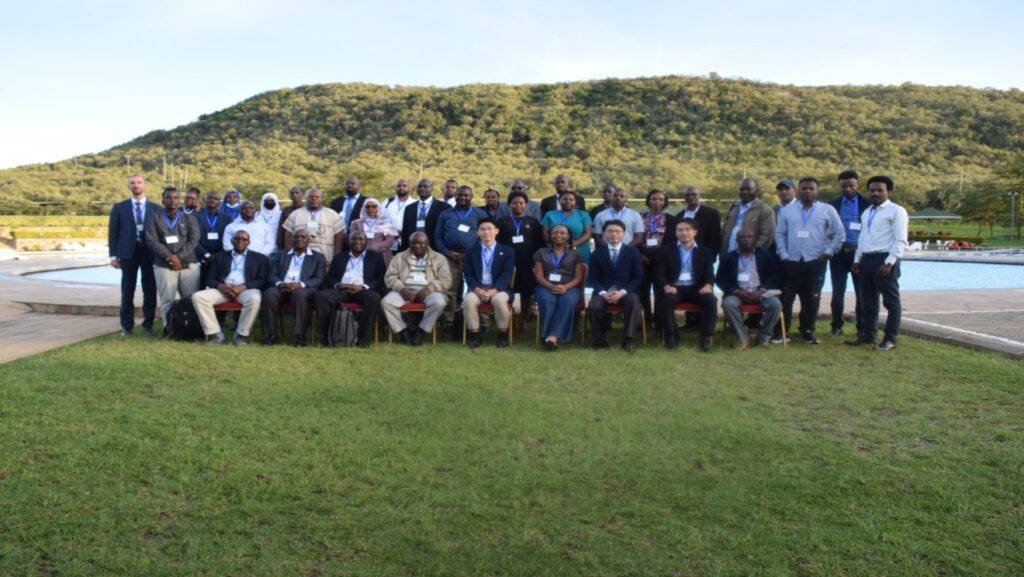UNIDO holds geothermal training programme for Eastern African countries
UNIDO holds geothermal training programme for Eastern African countries ThinkGeoEnergy


UNIDO Holds Geothermal Training Programme for Eastern African Countries
UNIDO recently concluded a geothermal capacity-building programme in Kenya and Japan with participants from East African countries.
Introduction
The United Nations Industrial Development Organization (UNIDO) recently concluded a capacity-building programme for experts and policymakers in geothermal development from Eastern African countries, namely Djibouti, Ethiopia, Kenya, Rwanda, the United Republic of Tanzania, and Uganda (targeted countries).
The capacity-building programme was organized under the UNIDO global programme “Generating energy capacity from geothermal power generation and its related technologies for sustainable development” (Geothermal Programme), funded by the Ministry of Economy, Trade and Industry of Japan.
The primary objective of the Geothermal Programme is to promote geothermal power generation and related technologies across African countries through collaborative efforts. This is accomplished through technology demonstrations, addressing barriers to accessing information and technical knowledge, capacity building to facilitate technology adoption and domestic replication, knowledge management activities, and the identification of viable and sustainable business models.
Furthermore, the programme also aims to strengthen market conditions to attract investments and foster public-private partnerships in the targeted countries. Drawing from UNIDO’s expertise and the success of similar projects in the region, the programme seeks to scale up investments and collaboration to benefit Africa.
Under the Geothermal Programme, the need for capacity building activities and the creation of an enabling environment through an enhanced policy and regulatory framework and partnerships were identified to stimulate the uptake of geothermal power generation, to effectively address challenges of climate change, energy poverty, and sustainable industrialization in the targeted countries.
Technical Training in Kenya
The technical training component was designed to cover three geothermal related thematic areas including:
- Geothermal engineering
- Geoscience
- Environmental and social analysis
These courses were conducted in Naivasha, Kenya in cooperation with the Kenya Electricity Generating Company PLC. and were attended by 25 experts (6 women) from the targeted countries. During the opening ceremony of the technical training organized in Naivasha on 12th May 2023, Lydiah Kathini Musyimi, UNIDO Desk Officer, State Department for Industry of Kenya, pointed out that “over the past years, Kenya has accumulated a wealth of experience in geothermal development and is eager to collaborate with neighboring nations by sharing its expertise.”
Policymaking Workshop in Japan
The partnership building and policy making component was conducted in Tokyo and Fukuoka, Japan, in cooperation with West Japan Engineering Consultants, Inc. It was attended by 22 policymakers and experts (7 women) from the targeted countries.
A series of activities were conducted under the component including:
- A workshop discussing the key enabling factors and challenges for geothermal development, and the role of public-private partnerships to support geothermal development in the Eastern African region
- A site visit to the biggest geothermal power plant in Japan, with an installed capacity of 110 MW
- A one-on-one business matching event with private sector entities
“Attending the event organized in Japan has been an enlightening experience. The exchange of ideas during the workshop and business matching event, and the technology showcased during site visits, reaffirmed our belief that geothermal energy can provide clean, reliable, and sustainable power for Eastern African countries,” said Ms. Sofiya Abdulkadir Ayano, Chief Executive Officer, Ministry of Mines and Petroleum of Ethiopia.
Conclusion
The capacity building program served as a comprehensive platform to promote the development of the geothermal sector in the region by providing advanced knowledge and skills and strengthening partnerships and networks between various stakeholders across the region.
The geothermal sector is expected to play an important role in the decarbonization of the energy sector across Eastern Africa. By harnessing this clean energy, East African nations can significantly reduce their carbon emissions and contribute to global climate goals. Moreover, the development of the geothermal sector in the Eastern African countries will create the preconditions for achieving the Sustainable Development Goals, particularly SDG 7 (Affordable and Clean Energy) and SDG 9 (Industry, Innovation, and Infrastructure).
Source: UNIDO
SDGs, Targets, and Indicators
1. SDGs Addressed or Connected to the Issues Highlighted in the Article
- SDG 7: Affordable and Clean Energy
- SDG 9: Industry, Innovation, and Infrastructure
The article highlights the importance of geothermal power generation and its related technologies for sustainable development. By promoting geothermal power generation, the article addresses the goal of affordable and clean energy (SDG 7). Additionally, the article mentions the need to strengthen market conditions, attract investments, and foster public-private partnerships, which are all relevant to the goal of industry, innovation, and infrastructure (SDG 9).
2. Specific Targets Under Those SDGs Based on the Article’s Content
- SDG 7.2: Increase substantially the share of renewable energy in the global energy mix
- SDG 9.1: Develop quality, reliable, sustainable, and resilient infrastructure, including regional and transborder infrastructure, to support economic development and human well-being
- SDG 9.5: Enhance scientific research, upgrade the technological capabilities of industrial sectors in all countries, in particular developing countries, including, by 2030, encouraging innovation and increasing the number of research and development workers per 1 million people
The article emphasizes the promotion of geothermal power generation as a renewable energy source. This aligns with SDG 7.2, which aims to increase the share of renewable energy in the global energy mix. The capacity-building program discussed in the article also contributes to SDG 9.1 by developing sustainable infrastructure for geothermal power generation. Furthermore, the program’s focus on technology demonstrations, knowledge management activities, and collaboration aligns with SDG 9.5, which aims to enhance scientific research and upgrade technological capabilities.
3. Indicators Mentioned or Implied in the Article
- Number of experts and policymakers trained in geothermal development
- Number of thematic areas covered in the technical training component
- Number of women participating in the capacity-building program
- Number of policymakers and experts attending the policymaking workshop
- Number of activities conducted under the partnership building and policy making component
- Number of private sector entities involved in the one-on-one business matching event
The article mentions the number of experts (25) and policymakers (22) who participated in the capacity-building program. This indicates the number of individuals trained in geothermal development, which can be used as an indicator to measure progress towards the targets. Additionally, the article highlights the thematic areas covered in the technical training component (geothermal engineering, geoscience, and environmental and social analysis), indicating the scope of knowledge imparted. The article also mentions the number of women participating in the program, which is an important indicator for gender equality. The number of policymakers and experts attending the policymaking workshop, as well as the number of activities conducted under the partnership building and policy making component, can also be used as indicators to measure progress. Lastly, the involvement of private sector entities in the business matching event indicates the level of private sector engagement, which is relevant for assessing progress towards the targets.
Table: SDGs, Targets, and Indicators
| SDGs | Targets | Indicators |
|---|---|---|
| SDG 7: Affordable and Clean Energy | 7.2: Increase substantially the share of renewable energy in the global energy mix | – Number of experts and policymakers trained in geothermal development – Number of thematic areas covered in the technical training component – Number of women participating in the capacity-building program |
| SDG 9: Industry, Innovation, and Infrastructure | 9.1: Develop quality, reliable, sustainable, and resilient infrastructure, including regional and transborder infrastructure, to support economic development and human well-being 9.5: Enhance scientific research, upgrade the technological capabilities of industrial sectors in all countries, in particular developing countries, including, by 2030, encouraging innovation and increasing the number of research and development workers per 1 million people |
– Number of experts and policymakers trained in geothermal development – Number of policymakers and experts attending the policymaking workshop – Number of activities conducted under the partnership building and policy making component – Number of private sector entities involved in the one-on-one business matching event |
Behold! This splendid article springs forth from the wellspring of knowledge, shaped by a wondrous proprietary AI technology that delved into a vast ocean of data, illuminating the path towards the Sustainable Development Goals. Remember that all rights are reserved by SDG Investors LLC, empowering us to champion progress together.
Source: thinkgeoenergy.com

Join us, as fellow seekers of change, on a transformative journey at https://sdgtalks.ai/welcome, where you can become a member and actively contribute to shaping a brighter future.








